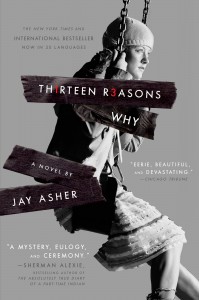 After a Florida elementary school pre-emptively banned students from bringing personal copies of Jay Asher’s Thirteen Reasons Why onto campus, CBLDF yesterday joined with other members of NCAC’s Kids’ Right to Read Project in urging principal Bryan Dolfi to reconsider. After the book was singled out in an email to parents of Stone Lakes Elementary students last month, a spokesperson for Orange County Public Schools added that all books labeled “mature teen” are banned from elementary campuses.
After a Florida elementary school pre-emptively banned students from bringing personal copies of Jay Asher’s Thirteen Reasons Why onto campus, CBLDF yesterday joined with other members of NCAC’s Kids’ Right to Read Project in urging principal Bryan Dolfi to reconsider. After the book was singled out in an email to parents of Stone Lakes Elementary students last month, a spokesperson for Orange County Public Schools added that all books labeled “mature teen” are banned from elementary campuses.
Thirteen Reasons Why was first published ten years ago, but has recently encountered a sudden surge in challenges, bans, and restrictions in schools around the country due to panicked adult backlash against the Netflix series based on it. The series in particular has been criticized by some for allegedly glamorizing teen suicide as it depicts the events leading up to the death of Hannah Baker, a high school student who kills herself after recording 13 cassette taped messages for people she feels contributed to her misery.
The Stone Lakes Elementary library held no copies of the novel, which is geared towards older readers, but guidance counselor Alison Morris said in an email last month that some students have read it independently and talked about it with their classmates. The email asked parents who are allowing their children to read the book to “please have them keep their copy at home as it is not appropriate for an Elementary School campus.”
A district spokesperson later clarified that Thirteen Reasons Why fell under a blanket ban from elementary campuses of all books labeled “mature teen,” but it is unclear who applied that designation to this book or others. Publisher Penguin Random House recommends Asher’s book for grades 7 and up, but does not use the phrase “mature teen.”
In the letter sent to Stone Lakes principal Bryan Dolfi yesterday, KRRP partners objected to the extreme overreach of a blanket ban on students’ personal reading material based on a subjective standard:
The fact that school officials believe a book’s content is too mature for elementary-school students is no justification for infringing upon students’ First Amendment right to receive and possess literature unless the books in question are likely to cause the disruption of school activities. See Tinker v. Des Moines 393 U.S. 503 (1969). There is no evidence that bringing 13 Reasons Why would in any way disrupt the educational process. Indeed, the ban has been justified solely on the grounds that the book contains allegedly inappropriate content.
Additionally, the letter notes the plethora of different age ratings and recommendations for any book, and expresses concern that “a ban based on a purely informational label violates both the rights of the students to access material and the right of parents to supervise their children’s extracurricular reading.” Check out the full letter below!
Orange County NCAC by betsy.gomez on Scribd